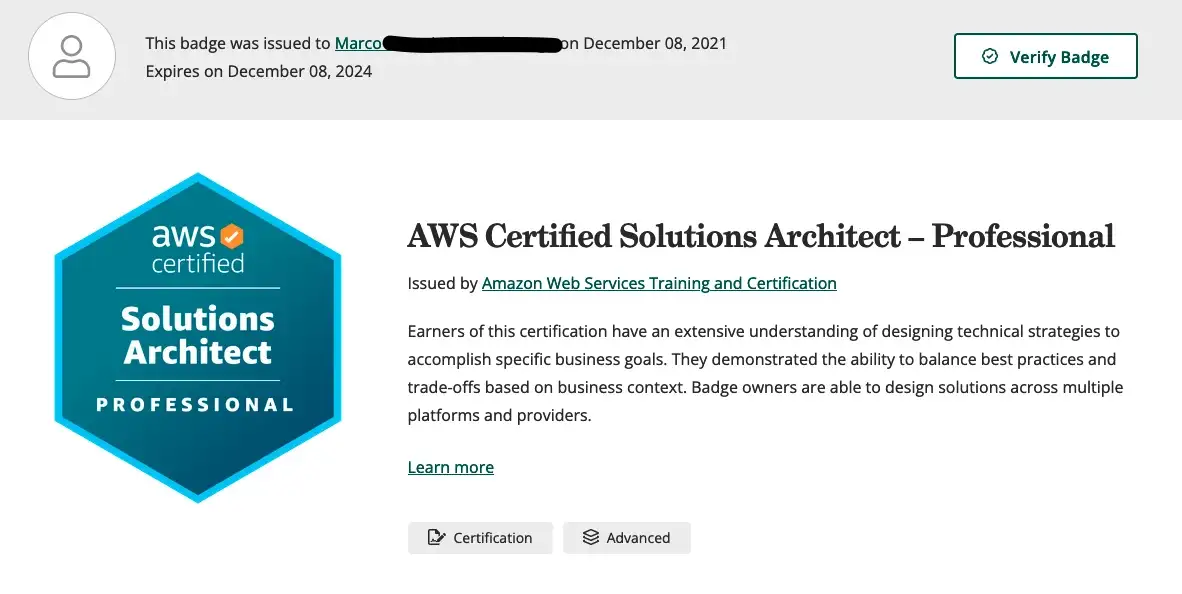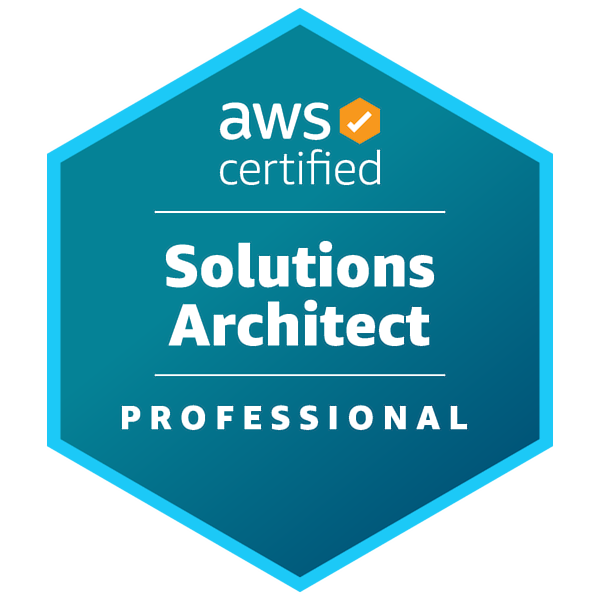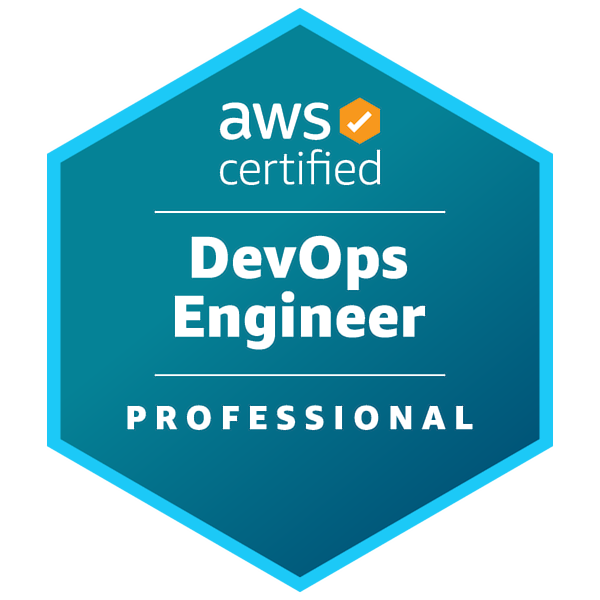Tips to pass the AWS Certified Solutions Architect — Professional (SAP-C01) exam
AWS Certifications are growing both in demand and popularity, here are some tips that will help youto pass the AWS Solutions Architect-Professional

If you are reading this, you may already know the AWS Certifications are a great way to improve your AWS expertise and are a high valuable achievement to have in your resume in this fast growing and high demanding times that we’re living the last years, that’s why I want to tell you about how did I pass one of the big certifications on AWS, the AWS Solutions Architect — Professional certification, this certification is arguably the most difficult one (at least top 3) according to many in the AWS certified community, 13x AWS certified experts and myself, even some sources estimate a failure rate between 50–72%, in fact I haven’t pass a single practice exam at the first attempt I’ve scored around 70% and I’ve repeat every single practice exam, but in this post I want to share with you some tips that could help you to prepare better against the big boss.
Before we start I’ll encourage you to download the official exam guide, reading this will give you the perspective of the number of services covered and the generalities of the exam.
Take the associate level exam first

This may seem obvious, but as far as I know AWS doesn’t have prerequisites to take certifications exams, so in theory you could jump straight into the professional level exam, but before you go with a knife into a gunfight hear me out.
The associate level exam, aside of the understanding of a great variety of services and concepts that AWS has to offer, it should help you to understand the desired mindset that a solutions architect must have this is really important on this branch of certifications, because unlike the other associate exams (that are difficult in other aspects) this one would test you more in a critical thinking rather than the specifics of the services that you’re using and that is the key for the professional level exam, your reasoning ability to identify the requirements and the value that you must provide to the customer.
Improve Your Mental Stamina
The thing that I hate the most about the professional level exams is the time that you must remain focused, the professional level exams if you don’t know already, have 10 more questions (75 total) that at the beginning sounds like almost the same as the associate level ones but it feels like 20 more questions because both the questions and choices are longer and more detailed so you must read carefully and spend more time per question than in the associate exams. The thing that helped me the most to overcome this was quickly identify just the relevant information for the solution, most of the time the questions tells you more information than you need, questions like
“Your government’s technology agency has recently hired you to build a mobile tax app that allows users to upload their tax deductions and income records using their devices. They would also be able to view or download their uploaded files later on. These files are confidential, tax-related documents that need to be stored in a single, secure S3 bucket. Your mobile app’s design is to allow the users to upload, view, and download their files directly from an Amazon S3 bucket via the mobile app. Since this app will be used by potentially hundreds of thousands of taxpayers in the country, you need to make sure proper user authentication and security features are in place. How should you implement your architecture when a new user registers on the app?”
could be read as
“Mobile app, hundred of thousands of public users upload confidential files into S3 bucket ¿how to properly authenticate those users?”
And that ability with practice in the long run could make the difference between running out of time or having extra time to review marked questions.
Identify Keywords
I’m pretty sure that you already know this, but this is the wider exam in terms of services covered, it’s almost impossible to remember all of the details of every service covered in this exam so I’ll recommend you to identify the strength of each service i.e:
- Decouple: SQS
- Archival: glacier
- Sub millisecond performance db: dynamodb (with DAX most likely)
- On premise with aws cloud network (cheap and fast setup): site to site vpn
- On premise with aws cloud network (fast connection and reliable): site to site vpn
- Authentication and authorization from mobile: assume role with web identity
And as those examples are hundreds of keywords or concepts that will help you to identify the correct answer, make your owns and remember them the day of the exam.
Discard Wrong Choices
Frequently you would be in the situation that you’re not sure about the right choice, but knowing which ones are wrong is one of the most powerful techniques in the AWS certification exams because part of being an expert is knowing which aren’t feasible or even possible solutions, for example in this question:
You are developing a prototype distributed system that requires a multithreaded event-based key/value cache store. The system will cache small arbitrary data, such as strings and objects, from the results of database and API calls. The cache layer should also enable the client programs to automatically identify all of the nodes in a cache cluster and to initiate and maintain connections to all of these nodes. Which of the following is the most suitable and cost-effective service that you should use?
A — Amazon ElastiCache for Redis
B — AWS Greengrass
C — Amazon ES
D — Amazon ElastiCache for MemcachedA is wrong because ElastiCache for Redis doesn’t support a multi-threaded architecture and also doesn’t have auto discovery feature, B is wrong because Greengrass is a service used in IoT to connect devices to Lambda, C is incorrect because Elastic Search is not a caching service, so the right answer is D.
Answer Confidently
When I was a teenager I used to practice sports and specifically in triathlon we used to say
The medals are earned in the training, the competition day you just go to pick them up.
So when you’re answering the exam be confident about your knowledge, the majority of times that I’ve changed a choice I made a mistake, remember you spent days, weeks, months or even years studying, you’re a capable professional and you’re sure of your answer.
Multiple Choice Questions
This type of questions are very common, they ask you for 2 or even 3 choices and if you have one wrong the entire question is wrong, so here is a tip to help you to answer this challenging questions. The multiple choice questions frequently have related choices that complements each other so the most common scenario is that you’re sure at least of one choice, but the other 3 options doesn’t sound familiar, my advice is to try to solve the puzzle by identifying which of the 3 choices left fits better with the one that I’m sure, for example if you’re being asked to setup a disaster recovery plan (DRP) and you’ve already answer that you’ve created a copy of the application in a different region look for a Route 53 failover policy.
Other common case for this type of questions is that they asked for 2 concerns, so if you’ve already answer one issue discard the choices related to the same issue, for example if you’re being asked for a solution to store and visualize the application logs and you’ve already answer to store the logs in a S3 bucket forget about the choices that are related to storage solutions and focus on visualize the information that you’ve already stored.
Recommended Resources
Every AWS certification that I took (including the 2 professional ones) I’ve watched the Stephane Mareek courses, reviewed the AWS guide/sample questions and took the tutorials dojo practice exams and I consider that those resources are good enough to pass this certification.
Good Luck!
Last but not least, I wish you good luck! the exam is hard but the reward is worth it.

